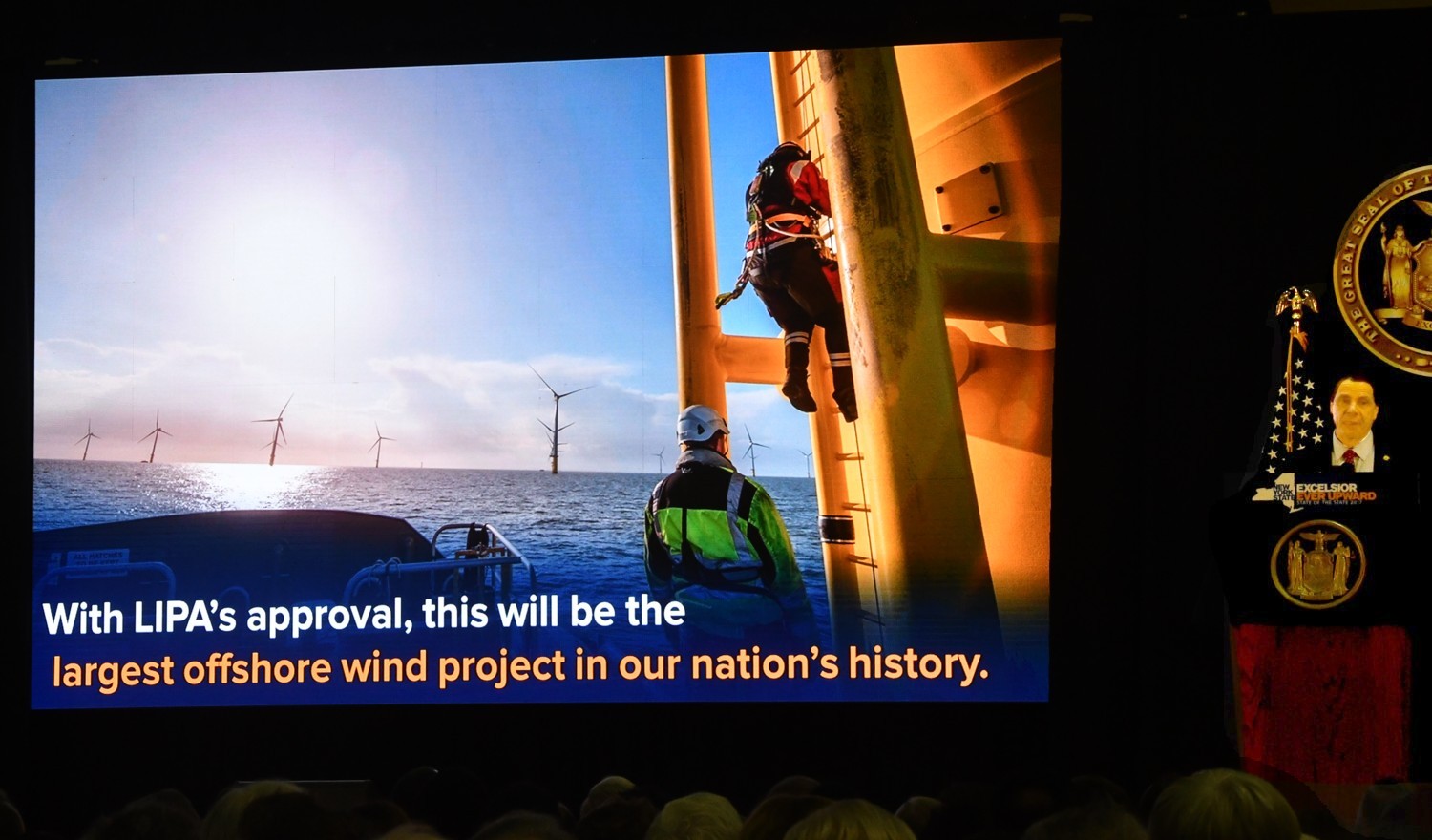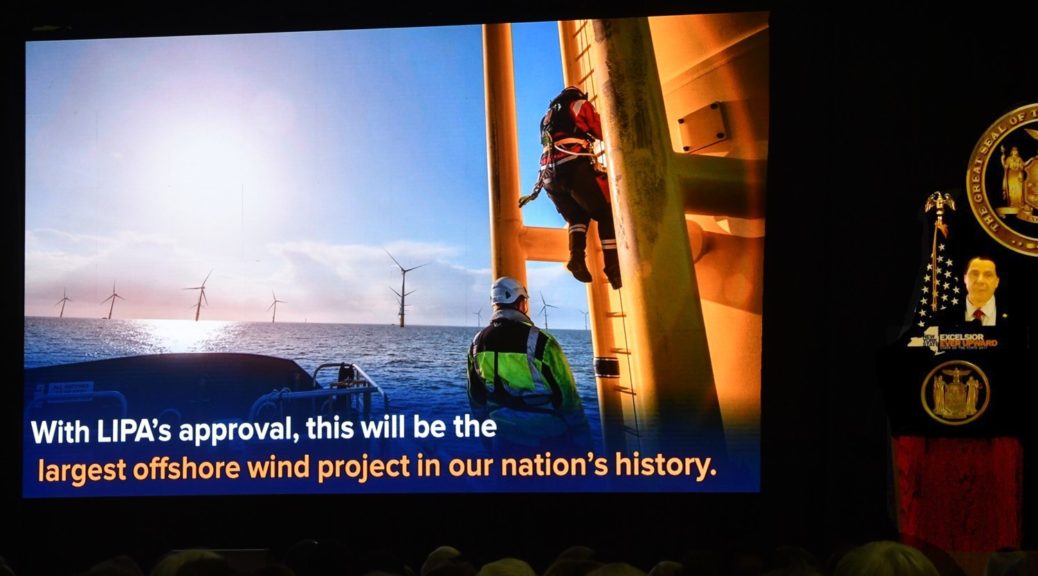North Carolina Joins Climate Alliance, Bringing Total Membership to 14 States and Puerto Rico
Alliance Represents 41% of American GDP and 117 Million Americans, Enough to Be World’s Third Largest Economy
Economies of Climate Alliance States Are Growing Faster than Non-Alliance States, Demonstrating that Fighting Climate Change and Creating Jobs Go Hand-in-Hand
Ambitious Expansion of NY Green Bank to Grow Sustainable Infrastructure Financing and Combat Climate Change

The U.S. Climate Alliance – a growing coalition of 14 states and Puerto Rico committed to reduce greenhouse gas emissions – are collectively on track to meet and possibly exceed their portion of U.S. commitment under the Paris Agreement. The announcement was made after the release of an independent report showing that U.S. Climate Alliance states are on track to reach a 24 to 29 percent reduction in emissions from 2005 levels by 2025, fulfilling their contribution to the Paris Agreement targets.
The co-chairs of the U.S. Climate Alliance – Governor Andrew M. Cuomo of New York State, Governor Jerry Brown of California, Governor Jay Inslee of Washington, along with former U.S. Secretary of State John Kerry – spoke at a news conference in New York as part of Climate Week where they highlighted how states are stepping in to fill the void of climate action left by the federal government.
The governors also announced North Carolina as the newest member of the U.S. Climate Alliance, bringing total membership to 15, representing 36 percent of the U.S. population and $7.6 trillion in GDP – 41 percent of America’s total and enough to be the world’s third largest economy.
“While the federal government abdicates its responsibility on climate change, governors do not have the luxury of denying a scientific reality, and it is more important than ever for states to take collective, common sense action,” Governor Cuomo said. “Today, New York State is picking up the mantle of leadership and raising the bar in the global fight against climate change. As a co-chair of the U.S. Climate Alliance, we are committed to upholding our share of the Paris Agreement, driving the clean energy economy, and ensuring a greener future for our children and for all Americans.”
“Governors Cuomo, Brown, and Inslee and other governors who are a part of the bipartisan U.S. Climate Alliance know the stakes in the climate fight,” former U.S. Secretary of State John Kerry said. “They are leading on climate where the federal government is failing to do so, joining partners in business and local government to ensure the U.S. is making progress every day. Today we are reaffirming to the American people and to the leaders from all over the world that the United States will not abandon the global community and put its children and grandchildren at risk.”
To accelerate progress and drive more critical climate-related investment, Governor Cuomo today also announced an ambitious expansion of NY Green Bank. Building on the success of its $400 million in commitments across 21 projects and robust pipeline of deals, NY Green Bank is today committing to work with the private sector to raise new funds, assist other states in the establishment of new Green Bank offices, and provide capacity to those new Green Banks for back-end services including due diligence, underwriting and general technical support.
The expansion will also allow NY Green Bank to better leverage public dollars and grow its own project development scope to clean energy projects in other states across the country. NY Green Bank is part of the State’s 10-year $5 billion Clean Energy Fund, which supports clean tech innovation and mobilizes private investment in clean energy in New York State. The Clean Energy Fund has already experienced successes beyond NY Green Bank – including its NY-Sun initiative that has helped facilitate over 800 percent growth in solar deployment over five years.
The bipartisan U.S. Climate Alliance was launched in June in response to President Trump’s announcement to withdraw the U.S. from the Paris Agreement. Today’s announcement marks the first time the U.S. Climate Alliance has quantified its emissions reductions. The main findings of the report include:
- U.S. Climate Alliance states are on track to reach a 24 to 29 percent reduction in greenhouse gas emissions from 2005 levels by 2025, fulfilling their contribution to the Paris Agreement targets.
- Between 2005 and 2015, Alliance states reduced greenhouse gas emissions by 15 percent compared to a 10 percent reduction by the rest of the country.
- During that same decade, the combined economic output of Alliance states grew by 14 percent while the rest of the country grew by 12 percent. On a per capita basis, economic output in Alliance states expanded twice as fast as in the rest of the country, showing that climate action and economic growth go hand in hand.
- The report outlines areas where USCA states will focus collective efforts, including to expand clean energy finance tools, modernize the power sector, design energy efficient buildings, develop a green transportation system, build climate resilient infrastructure, and protect natural resources.
The U.S. Climate Alliance’s progress report comes two months before world leaders convene in Germany for COP23, where countries will further detail their plans to meet the Paris Agreement. Countries from around the world have reaffirmed their commitment to continue reducing emissions, despite President Trump’s withdrawal from the climate agreement. U.S. Climate Alliance governors plan to attend COP23 this fall to report on their climate progress and detail further plans and additional solutions to pool resources and confront the global threat of climate change.
The U.S. Climate Alliance builds on other recent advancements, such as the commitment by nine Northeastern and Mid-Atlantic states to reduce greenhouse gas emissions by 30 percent over the next two decades through the Regional Greenhouse Gas Initiative (RGGI).
“Today’s announcements reflect Governor Cuomo’s continued climate leadership, both in convening the U.S. Climate Alliance and through accelerating NY Green Bank to further advance financing solutions for sustainable infrastructure and clean energy. The U.S. Climate Alliance is showing that reducing emissions and economic growth can happen together, and NY Green Bank’s central effort in this regard to raise new capital will provide greater confidence to the marketplace, driving down costs for all while expanding New York’s clean energy economy,” New York State Chairman of Energy and Finance Richard Kauffman said.
Basil Seggos, Commissioner, Department of Environmental Conservation, said, “Governor Cuomo is leading the nation to address what is arguably the greatest environmental threat of our generation by reducing emissions and bolstering community resiliency, while the federal government has abdicated its responsibility. From statewide efforts to increase renewable energy sources and ramp up energy efficiency, to supporting communities to reduce greenhouse gas emissions, New York is working to address the threat of climate change. We’re not sitting by the sidelines; New York and our partner states in the US Climate Alliance are taking action and clearly reaping the economic rewards of climate action.”
New York’s Climate Leadership
United States Climate Alliance: Cofounded the bipartisan U.S. Climate Alliance to uphold the emissions reduction goals of the Paris Agreement on climate change at the state-level. The U.S. Climate Alliance now accounts for nearly $7.6 trillion in GDP, enough to be the world’s third-largest economy.
Greenhouse Gas Emission Reductions: Established ambitious greenhouse gas emission reduction targets to reduce emissions 40 percent below 1990 levels by 2030 and 80 percent by 2050. These targets have made New York a leader across the country in fighting climate change.
Regional Greenhouse Gas Initiative (RGGI): Spearheaded the formation of the successful RGGI cap-and-trade program among northeast and mid-Atlantic states, led effort to reduce RGGI’s carbon emission cap by 45 percent in 2014, and recently called for an additional cap reduction of at least 30 percent between 2020 and 2030.
Reforming the Energy Vision: Established a comprehensive energy strategy to make the vision for a clean, resilient, and affordable energy system a reality, while actively spurring energy innovation, attracting new jobs, and improving consumer choice.
Clean Energy Standard: Established the most comprehensive and ambitious clean energy mandate in the state’s history, requiring that 50 percent of electricity in New York come from renewable energy sources like wind and solar by 2030.
Clean Energy Fund: Established a $5 billion fund that is jump-starting clean-tech innovation, mobilizing private investment, capitalizing the nation’s largest Green Bank, and helping eliminate market barriers to make clean energy scalable and affordable for all New Yorkers.
Coal-Free New York: Committed to close or repower all coal-burning power plants in New York to cleaner fuel sources by 2020.
Offshore Wind: Approved one of the nation’s largest offshore wind energy projects off the Long Island coast in 2017 and made an unprecedented commitment to develop up to 2.4 gigawatts of offshore wind power by 2030.

